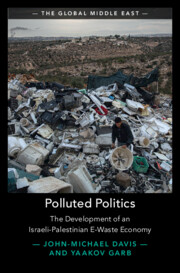2 results

Polluted Politics
- The Development of an Israeli-Palestinian E-Waste Economy
-
- Published online:
- 18 December 2024
- Print publication:
- 05 December 2024
9 - Open Questions, Opening Futures
- from Part II - Pathways and Predicaments
-
- Book:
- Polluted Politics
- Published online:
- 18 December 2024
- Print publication:
- 05 December 2024, pp 205-220
-
- Chapter
- Export citation

